7AU1知识点
牛津7A_unit1-unit8_单元知识点总结

7A 单元总结7A Unit1、2 一、词组或短语二、重点句子1。
What’s your name? My name's…/ I’m…2。
I love reading。
/ I l ove playing football after school./She loves dancing.3. 。
4。
She works hard. 她学习/工作很努力。
5。
I like listening to music。
6. She is good at swimming。
= She does well in swimming. 她擅长于游泳。
7。
She wears glasses。
8。
He enjoys playing computer games.9.10. I take my dog for a walk every day. 我每天带有的狗去散步。
11。
I usually go running for half an hour in the morning.12. 。
他为黄河足球队效力(踢球)。
13. He is good at scoring goals。
他擅长于射门得分。
14。
He wants to play in the next World Cup.15。
你在课内说英语说得越多,你将学得越快。
16. ?你对你的新朋友有多了解?17. “I’m sorry, I don’t know。
”18. Can I borrow your pen?四、语法学习带有be动词和do动词的一般现在时.一般现在时:阐述一般的客观事实;目前存在的事实;经常的习惯性的动作.(1)当主语是第三人称单数时:肯定句:主语+is+其他/主语+动词的等三人称单数形式+其他。
如:He is kind.Nancy lives in Nanjing.否定句:主语+isn't+其他/主语+doesn’t+动词原形+其他如:He isn’t a student.Nancy doesn't live in Nanjing.疑问句:Is+主语+其他/Does+主语+动词原形+其他如:Is she your mother? Does Nancy live in Najing?(2)当主语不是第三人称单数时:肯定句:主语+am/are/动词原形+其他如:I am a boy. They like apples.否定句:主语+am not/are not+其他/主语+don’t+动词原形+其它如:They don't like apples.They are not friends.疑问句:Am/Are+主语+其他Do+主语+动词原形+其它如:Do they like apples?Are they good students?7A Unit31. 你最喜爱的科目是哪门? Which of the subjects do you like best?=Which is your favourite subject subject?2. 因此我可以吃三块. So I can eat three。
七年级unit1知识梳理解读

牛津英语7A Unit 1 This is me 部分知识归纳【词组归纳】look after 照顾make friends (with sb.) (与某人)交朋友welcome to 欢迎来到live in 居住在the Reading Club 阅读俱乐部come from 从……来,来自于……be born 出生after school 放学后play football 踢足球at school 在上学,在求学listen to music 听音乐be good at doing 擅长做;在…方面学的好 work hard 努力工作;努力学习enjoy doing sth 爱好(喜欢)做某事wear glasses 戴眼镜It’s time for 到了…的时间tennis racket 网球拍on the football field 足球场on the tennis court 网球场football boots 足球鞋in the swimming pool 游泳池have breakfast 吃早饭/餐talk to sb. 与某人谈话take my dog for a walk 带我的狗去散步watch TV 看电视every day 每天;天天walk home 走回家take a bus 乘公共汽车at the weekend 在周末go running 去跑步fly a kite with sb. 与某人一起放风筝half an hour 半小时have dinner 吃晚饭at my grandparents’ home 在我祖父母家the World Cup 世界杯the newest member 最新成员the Computer Club 电脑兴趣小组play computer games 玩电子游戏the Music Club 音乐兴趣小组look for things on the Internet 网上搜寻/浏览the answer the……的答案dark brown 深褐色play with sb. 和某人一起玩live with sb. 和某人一起住【日常用语】Hi, I’m Sandy. What’s your name?你好,我叫桑迪。
牛津英语7Aunit1知识点
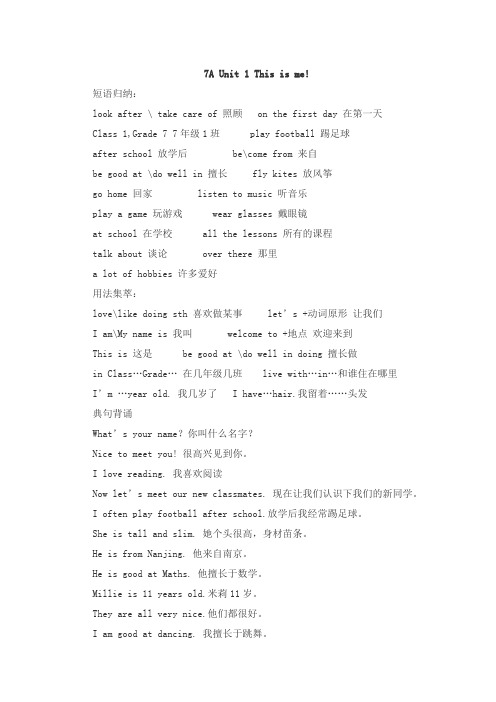
7A Unit 1 This is me!短语归纳:look after \ take care of 照顾 on the first day 在第一天Class 1,Grade 7 7年级1班 play football 踢足球after school 放学后 be\come from 来自be good at \do well in 擅长 fly kites 放风筝go home 回家 listen to music 听音乐play a game 玩游戏 wear glasses 戴眼镜at school 在学校 all the lessons 所有的课程talk about 谈论 over there 那里a lot of hobbies 许多爱好用法集萃:love\like doing sth 喜欢做某事 let’s +动词原形让我们I am\My name is 我叫 welcome to +地点欢迎来到This is 这是 be good at \do well in doing 擅长做in Class…Grade…在几年级几班 live with…in…和谁住在哪里I’m …year old. 我几岁了 I have…hair.我留着……头发典句背诵What’s your name?你叫什么名字?Nice to meet you! 很高兴见到你。
I love reading. 我喜欢阅读Now let’s meet our new classmates. 现在让我们认识下我们的新同学。
I often play football after school.放学后我经常踢足球。
She is tall and slim. 她个头很高,身材苗条。
He is from Nanjing. 他来自南京。
He is good at Maths. 他擅长于数学。
Millie is 11 years old.米莉11岁。
7A七年级上册英语Unit 1知识点梳理

Unit 1知识点梳理1.e-dog 可数名词,“电子狗”an e-dog 一只电子狗类似:e-mail 电子邮件/e-book电子书/e-friend 网友2.how to do sth. “如何做某事” // what to do “做什么”3.look after “照顾,照看”= take care oflook after...well [动词+副词] = take good care of... [ 形容词+名词] “好好照顾……”4.get to know “认识”表示认识的过程5.some of the + 名词复数形式“……中的一些”作主语时,谓语动词用复数形式。
6.I’m + 名字= My name is + 名字提问:What’s your name?May I have your name, please?7.Good evening. “晚上好”(傍晚或夜晚见面时的问候语)Good night. “晚安”(夜晚的告别用语,含有再见的意味)8.Nice to meet you. “见到你很高兴。
”回答:Nice to meet you too.9.welcome 感叹词,“欢迎”welcome to... “欢迎来到……”,后接表示地点的here,there,home等副词。
adj. “受欢迎的”,可作定语,也可作表语。
“Sb. + be welcome to + 地点”意为“欢迎某人来某地”。
[辨析] You’re welcome. “不用谢,别客气。
”10.Class 1, Grade 7 七年级一班也可写作:Class One, Grade Seven(注意首字母大写)提问哪个年级:What grade are you in ?提问哪个班级:What class / Which class…?11.主语+be+基数词(+years old). “某人多少岁了。
”提问年龄:how old12.love 及物动词,“喜欢,喜爱”love doing sth. (倾向于表示习惯性的动作)love to do sth. (倾向于表示具体的或者一次性的动作)13.reading n. “阅读,读书”do some reading “阅读,读书” 类似:dancing/swimming等14.Let’s do sth. “让我们做某事吧”let’s是let us的缩写Let’s do sth. 常用于提出建议或请求对方同自己一起做某事let’s包括说话者和听话者双方[let’s反意疑问句: Let’s …, shall we? ]let us只包括说话者一方,不包括听话者[let us反意疑问句: Let us …, will you?]15.频率副词:often,always,usually,never提问:how often [once a day; twice a month, three times a year …]16.play football “踢足球”play basketball/volleyball/badminton “打篮球/排球/羽毛球”play chess “下国际象棋”play the piano/violin “弹钢琴/拉小提琴”play with sb. “与某人玩耍”17.music 不可数名词,“音乐,乐曲”a piece of music “一首曲子”[不可数名词] love work advice music news information weather traffic fun progress18.be from “来自”=come fromcome from,否定:don’t/doesn’t come from;疑问:Do/Does e from?be from,否定:am/is/are not from;疑问:Am/Is/Are...from..?19.be good at “擅长……”= do well inbe good at doing sth.do well in doing sth.[辨析] be good for “对……有益” // be good to 对…对…很慈善对…好20.hair 不可数名词,“头发;毛发”当表示一根一根的“头发”或“毛发”时,也可以用作可数名词。
新牛津英语7Aunit1主要知识点

教学目标:复习unit1主要知识点与应用1. 不定代词的用法:不定代词+形容词不定代词+ to do sth. (不定式)Eg: something to drink something to eat anything to readSomething important something unusual anything interesting2.“数词+more+可数名词”=another +数词+可数名词“数词+more+量词+of+不可数名词”=another +数词+量词+of +不可数名词some more意为“再多一些”,后可接不可数名词或复数名词3 believe what he/she says=believe his/her words=believer him/her意为“相信他/她说的话”believe in sb. =trust sb.意为“信任某人”。
4. Have problems doing sth.在某方面有问题= Have problem with sth.5.tell lies= tell a lie tell funny jokes = tell a funny joke tell an interesting storytell sb. jokes 给某人讲笑话Say a bad word about sb. = say bad words about sb.(1) tell,talk,speak,say的区别honest以元音因素开头,故当表示“一位诚实的...”应用“an hone st boy”,反义词为dishonest 不诚实的be honest with sb.对某人坦诚keep a secret 保密keep secrets 保密make me happy 使我开心make 的用法:make sb +adj / do/ nShare my joy 分享我的快乐joy 快乐不可数名词=happinessShare sth with sb 与某人分享某物Care about 关心talk to/with sb about sth 与某人讨论关于某事tell sb.(about)sth. 告诉某人关于某事be ready to do sth 乐意做某事,准备做某事=get ready to do sth 准备做某事w hat makes good friends,Amy?什么样的人会成为好朋友what 作主语,动词用三单.agree with sb. 同意某人的观点agree to do sth. 同意做某事6. maybe与may be有何区别?7. (1)“Why don’t we/ you+动词原形”或“Why not+动词原形” “为什么不...?”(2)“Would/ Will you please+动词原形” “请你......好吗?”8. One of +the(these, those, our)+形容词最高级+可数名词复数作主语时谓语动词用单数。
7AU1知识点梳理

七年级第一学期牛津英语知识点梳理Unit one知识点梳理:III. 词性转换:1. invite v. 邀请→ invitation. cn. 邀请函,请柬2. expensive adj. 昂贵的→ expense cn./un. 费用3. agent n. 代理人;经纪人→ agency n. 代理处4. national n. 国家的→ nation adj. 民族;国家→ international adj. 国际的5. interest n. 吸引力;趣味→ interested adj. (人)对…感到有趣味的→ interesting adj. (物) 有趣味的6. wonderful adj. 精彩的;令人高兴的→ wonder n. 奇迹7. another pron. 另一(事物或人)→ other pron./ adj. 其它的8. history n. 历史→ *historical adj. 历史上的,实际发生过的(有关历史的事实)III. 语言点/句型:1.I’ve got a letter from Uncle Weiming.我收到一封来自伟明叔叔的信get a letter from sb. = receive a letter from sb. = hear from sb.[e.g.] : My sister got a letter / received a letter / heard from her penfriend yesterday.2. He has invited us to stay with his family in August. 他邀请我们在八月与他的家人待在一起invite sb. to do sth. 邀请某人做某事3. Are we going to travel to Beijing by plane? 我们乘飞机去北京吗?travel to…by plane = fly to… =take a plane to…by plane (by + transport)eg. Are we going to travel to Beijing by planeAre we going to take a plane to Beijing?4. Let’s talk to Mum and Kitty.让我们与妈妈和kitty讨论下talk to /with sb. about sth. 与…讨论…talk with Mum about the trip.5. We’d like to travel to Beijing by plane.我们向乘飞机去北京旅行would like (sb.) to do sth. = want (sb.) to do sth.6 How long does it take to travel from Garden City to Beijing by plane? 乘飞机从花园城市到北京要多久?how long(时间多久),主要用来提问一段时间。
7au1知识点

U11词汇1.1 ***love/like to do/doing/sth1.1.1词义辨析1.2 ***electronic 形容词电子的,和电子有关的。
1.2.1 拓展延伸electric “电的,用电的,带电的”,指任何电动的或发电的装置,被修饰的物体本身可带电。
electric light, electric stove, electric piano, electric motor, electric bellelectrical为“电的,与电有关的,电气科学的”,指与电有关的事物,被修饰的词本身并不能带电。
electrical engineer, electrical energy, electrical engineering1.3 ***I’m ……=My name is ……1.3.1用于自我介绍中文姓在前名在后首字母均大写Han Meimei英文名在前姓在后首字母均大写Tim Cook姓family name/last name 名given name/first nameWhat’s your name?回答My name is ……/I am……可省略成I’m其他询问姓名方式Can you tell me your name?May I have yo5ur name?Are you ……? 你是……吗?询问对方的姓名、职业或情况回答Yes, I am.(不能用I’m缩写)/No, I’m not.1.4 ***master 名词主人,大师1.5 ***read, look, see, watch的区别1.5.1 词义辨析1.5.2 拓展延伸关于look的常见词组look after 照顾=take care of look after ……well=take good care of……look at 看look for 寻找look up 查找look behind 向后看look through 浏览look out of 向外看look like 看起来像look out当心小心1.6***Good morning.早上好可省略说成Morning.1.6.1拓展延伸Good afternoon. 下午好Good evening. 晚上好Good night. 晚安称呼语放在后面用逗号隔开1.7 ***hi和hello美国人打招呼多用hi,而在英国hi的用法等于hey。
牛津英语7AU1知识点校对版

牛津英语7AU1知识点校对版7A Unit 1 This is me!1.Oh, I love e-dogs. 哦,我喜欢电子狗。
解析:e-dog:可数名词,意为“电子狗”。
一只电子狗:an e-dog, 类似的有:e-mail 电子邮件e-book 电子书,e-friend 网友2.Now read this book. 现在读这本书吧。
解析:祈使句,在英语中表示建议,命令,或请求的句子叫祈使句。
祈使句常用动词原形开头。
如:Look at the blackboard, please.请看黑板。
Tom, come here. T om,来这。
3.I’m Amy. 我是艾米。
解析: “I’m +名字”或者“My name is +名字”句型常用来向他人作自我介绍,意思为:我叫......对于姓名的提问:What’s your name, please?May I have your name , please?4.Nice to meet you. 很高兴认识你。
解析:常见的打招呼用语,多用于第一次见面,回答:Nice to meet you, too.如:---My name is Tim. It’s my first time to be here.---_______________________.A.Very well, thank youB. It’s all.C. That would be very nice.D. Nice to meet you.5.Welcome to Class 1, Grade 7! 欢迎来到七年级一班!解析:welcome:1.动词,意为“欢迎”,用于对刚刚到达的人表示欢迎,welcome to +地点,表示“欢迎来到......”,如果后接地点副词时,则要省略to。
如:Welcome to China!欢迎来到中国。
Welcome to our school! 欢迎来到我们学校。
牛津英语7A Unit 1 复习讲义

牛津英语7A Unit 1 复习讲义【2011山东济宁】22. Most British high school children ______ uniforms at school.A. wearB. dressC. put onD. dress up 【2011广安市】27. -David, can you _______ yourself?[来源:学,科,网Z,X,X,K] -Of course, I can.A. dressB. put onC. wear【小试牛刀】( ) 1. Could you _______ me your dictionary? I want to find the meaning of this new word.A. keepB. lentC. borrowD. lend ( ) 2. I can ______ you my dictionary, but you can _______ it for only a week.A. borrow; borrowB. lend; borrowC. borrow; keepD. lend; keep 【2011•铜仁】23.— How long can I ________ the book?—For two weeks.A. keepB. borrowC. lendD. buy【2011浙江衢州】21.-----May I borrow these two books, please?----Yes, you can _____them for two weeks.A. borrowB. lendC. buyD. keep【2011•四川南充】29. When I was young, my father used to________ me some interesting stories.A. sayB. tellC. talk( ) 2. Can you _______ it in Chinese?A. speakB. sayC. tellD. talk ( ) 3. Sit down, children. I’m going to _____ you a story.A. speakB. talkC. tellD. say ( ) 4. --Does Meimei speak English very well.--Yes, she and her classmates often ____ to each other in English.A. speakB. talkC. sayD. tell【2011.广西北海】42. Xu Qian is a funny girl. She loves to __________ jokes.A. speakB. sayC. tellD.talk1. I’ll stay here for ____________.2. Mary will be back ____________in October.3. Our school is ____________ larger than theirs.4. Tom goes to school on foot, but ____________ by bike.二、语法点拨:一般现在时(1)基本用法①经常性或习惯性的动作,常与表示频度的时间状语连用。
译林版英语七年级上册7Aunit1知识点

译林版英语七年级上册7Aunit1知识点7A Unit 1 Knowledge Summary and nVocabulary Analysis]1.GradeXXX means "year of study"。
When referring to a specific grade。
it is often expressed in the form of a phrase: "Grade + cardinal number"。
with the first letter capitalized。
For example。
Grade Eight / Grade 8.It can also be used with "the + ordinal number + grade"。
In n。
grade also means "score".My brother is in Grade Two = My brother is in the second grade。
All the students get good grades.2.Be good at (doing) sth.Be good at (doing) sth。
means "to be skilled at (doing) something"。
"At" is a n that is followed by a noun or a verb in the -ing form.Is your sister good at dancing?3.SwimmingSwimming is a noun that means "the sport or activity of swimming"。
It is XXX the final consonant of the verb "swim" and adding the suffix -ing。
江苏译林7A U1-4 重点知识点
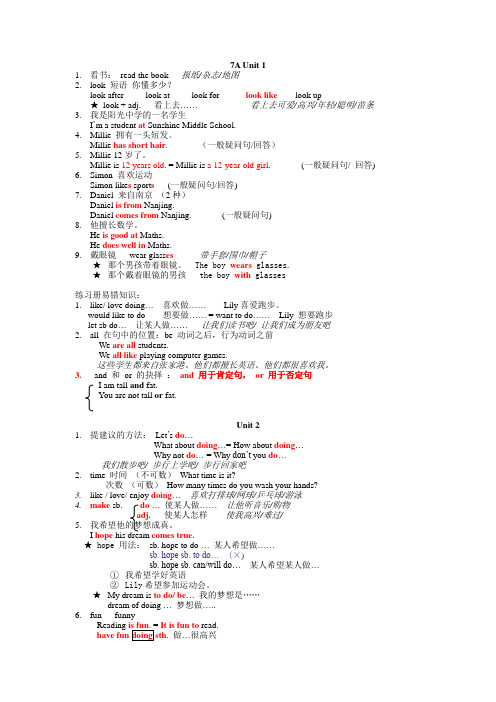
7A Unit 11.看书:read the book 报纸/杂志/地图2.look 短语你懂多少?look after look at look for look like look up★look + adj. 看上去……看上去可爱/高兴/年轻/聪明/苗条3.我是阳光中学的一名学生I’m a student at Sunshine Middle School.lie 拥有一头短发。
Millie has short hair. (一般疑问句/回答)lie 12岁了。
Millie is 12 years old. = Millie is a 12-year-old girl. (一般疑问句/ 回答) 6.Simon 喜欢运动Simon like s sport s (一般疑问句/回答)7.Daniel 来自南京(2种)Daniel is from Nanjing.Daniel comes from Nanjing. (一般疑问句)8.他擅长数学。
He is good at Maths.He does well in Maths.9.戴眼镜wear glass es带手套/围巾/帽子★那个男孩带着眼镜。
The boy wears glasses.★那个戴着眼镜的男孩 the boy with glasses练习册易错知识:1.like/ love doing…喜欢做……Lily喜爱跑步。
would like to do 想要做…… = want to do……Lily 想要跑步let sb do…让某人做……让我们读书吧/ 让我们成为朋友吧2.all 在句中的位置:be 动词之后,行为动词之前We are all students.We all like playing computer games.这些学生都来自张家港。
他们都擅长英语。
他们都很喜欢我。
3.and 和or 的抉择:and 用于肯定句,or 用于否定句I am tall and fat.You are not tall or fat.Unit 21.提建议的方法:Let’s do…What about doing…= How about doing…Why not do… = Why don’t you do…我们散步吧/ 步行上学吧/ 步行回家吧2.time 时间(不可数)What time is it?次数(可数)How many times do you wash your hands?3.like / love/ enjoy doing…喜欢打排球/网球/乒乓球/游泳4.make sb. do…使某人做……让他听音乐/购物adj. 使某人怎样使我高兴/难过/5.我希望他的梦想成真。
7AUnit1知识点归纳
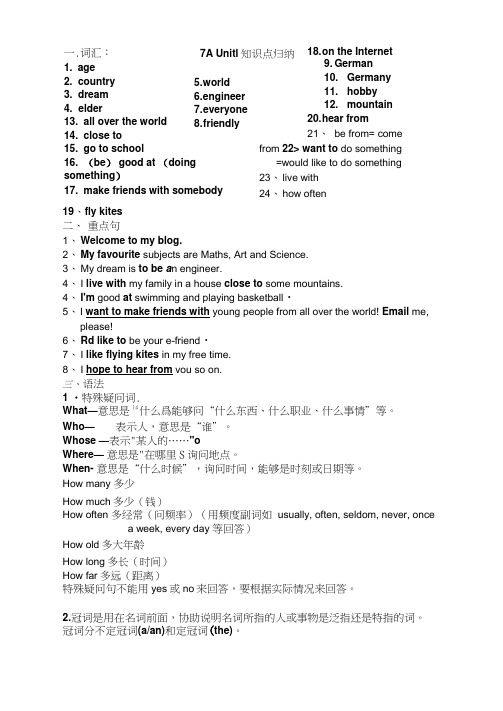
一.词汇:1. age2. country3. dream4. elder13. all over the world14. close to15. go to school16. (be ) good at (doingsomething )17. make friends with somebody18. o n the Internet 9. German 10. Germany 11. hobby 12. mountain 20. h ear from 21、 be from= come from 22> want to do something =would like to do something 23、 live with 24、 how often19、fly kites 二、 重点句1、 Welcome to my blog.2、 My favourite subjects are Maths, Art and Science.3、 My dream is to be a n engineer.4、 I live with my family in a house close to some mountains.4、 I'm good at swimming and playing basketball ・5、 I want to make friends with young people from all over the world! Email me,please!6、 Rd like to be your e-friend ・7、 I like flying kites in my free time.8、 I hope to hear from vou so on.三、 语法1 •特殊疑问词.What —意思是14什么爲能够问“什么东西、什么职业、什么事情”等。
译林牛津7Aunit1知识点
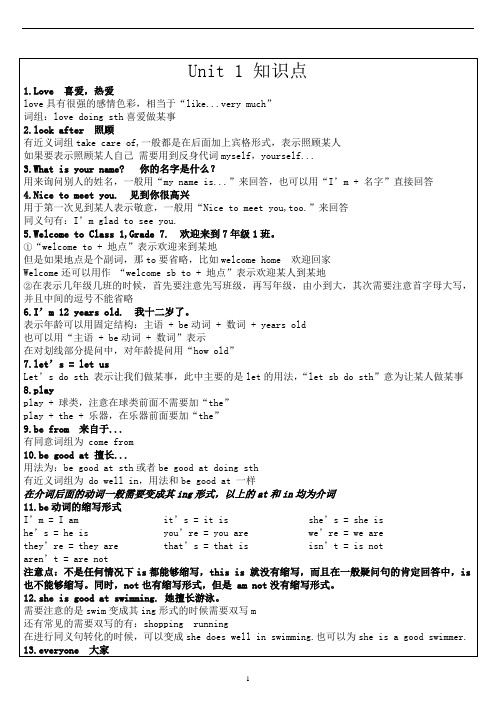
good只能用作形容词,可以做标表语,放在be动词之后,也可以作定语,放在名词之前
例如:My English is good. She is a good student.
She learns English very well.此句作为区别
3.and,but,or
8.play
play +球类,注意在球类前面不需要加“the”
play + the +乐器,在乐器前面要加“the”
9.be from来自于...
有同意词组为come from
10.be good at擅长...
用法为:be good at sth或者be good at doing sth
有近义词组为do well in,用法和be good at一样
chat意为“闲谈”,用法为:chat with sb和某人闲谈
2.good和well的区别
两者都表示“好的”。
well可以用作形容词也可以作副词,作为形容词的时候,只有一种用法,表示“身体好的”
且只能做表语,即只能放在be动词之后,如:My mother is well.相当于My mother is fine.
地点如果是大地点用in,如果是小地点用on,如果具体到门牌号则用at
15.wear和put on的区别
两者都表示“穿”,wear强调“穿着,戴着”的状态,指习惯性的穿着,可以指已经穿好
put on强调“穿”的动作,表示之前没有穿。
16.glass
①意为“玻璃”,是不可数名词
②意为“玻璃杯”,是可数名词,复数形式是glasses
③glasses意为“眼睛”,只有复数形式,用法:wear glasses,a pair of glasses
(完整word版)7AU1-U4知识点清单
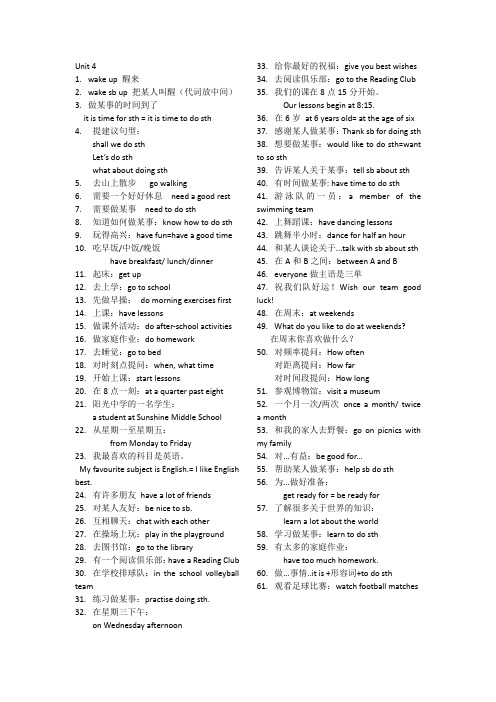
Unit 41.wake up 醒来2.wake sb up 把某人叫醒(代词放中间)3.做某事的时间到了it is time for sth = it is time to do sth4.提建议句型:shall we do sthLet’s do sthwhat about doing sth5.去山上散步go walking6.需要一个好好休息need a good rest7.需要做某事need to do sth8.知道如何做某事:know how to do sth9.玩得高兴:have fun=have a good time10.吃早饭/中饭/晚饭have breakfast/ lunch/dinner11.起床:get up12.去上学:go to school13.先做早操:do morning exercises first14.上课:have lessons15.做课外活动:do after-school activities16.做家庭作业:do homework17.去睡觉:go to bed18.对时刻点提问:when, what time19.开始上课:start lessons20.在8点一刻:at a quarter past eight21.阳光中学的一名学生:a student at Sunshine Middle School22.从星期一至星期五:from Monday to Friday23.我最喜欢的科目是英语。
My favourite subject is English.= I like English best.24.有许多朋友have a lot of friends25.对某人友好:be nice to sb.26.互相聊天:chat with each other27.在操场上玩:play in the playground28.去图书馆:go to the library29.有一个阅读俱乐部:have a Reading Club30.在学校排球队:in the school volleyball team31.练习做某事:practise doing sth.32.在星期三下午:on Wednesday afternoon 33.给你最好的祝福:give you best wishes34.去阅读俱乐部:go to the Reading Club35.我们的课在8点15分开始。
上海牛津英语7AU1笔记

7AU1Relatives in Beijing笔记词汇1.invite v.邀请—(an) invitation n.请柬2.agent n.代理人—agency n.代理社3.national adj.国家的—nation n.国家—nationality n.国籍e.g. 国家:China (中国)-- 国籍:Chinese (中国的)4.history n.历史—historical adj. 历史的5.interest n.吸引力,趣味-- interesting adj.使人感兴趣的,有趣的interested 有兴趣的be interested in…对……感兴趣6. another (两者以上不特指)另外一个e.g. I have eaten an apple, but I would like another (one).两者:one…the othere.g. There are two apples. One is for my brother and the other is for me.两者以上: some…otherse.g. There are many students on the playground. Some are playing basketball and others are playing football.7. cheap adj.便宜的cheaper 更便宜the cheapest 最便宜8. expensive adj.昂贵的more expensive 更昂贵the most expensive 最昂贵9. interesting adj.使人感兴趣的more interesting the most interesting词组1. relatives in Beijing 在北京的亲戚2. plan a trip to Beijing 计划一次去北京的旅行3. get a letter from sb. 收到某人的来信4. invite us to stay with his family 邀请我们和他的家人待在一起—invite sb. to do sth. invite sb. to sp.5. in August 在八月—in +年,月,季节6. send us a photograph 给我们发送了一张照片--send sb. sth.= send sth. to sb.7. cheaper and more interesting 更便宜而且更有意思8. That’s a good idea.那是个好主意9. at the travel agent’s在旅行社10. be going to do sth 打算去做某事11. would like to do sth.=want to do sth. 想要去做某事12. It takes sb some time to do sth. 花了某人多长时间去做某事--对some time提问用How long13. How much does it cost? =How much is it? 要花多少钱?14. on 16 August /on the sixteenth of August 在8月16日15. at the end of August 在八月底16. get there / get here / get home 到那/ 到这/ 到家17. See you soon. 再见18. Welcome to Beijing 欢迎来北京19. the Li family 姓李的一家人20. arrive in Beijing 到达北京--arrive in+大地方at+小地方=get to…= reach...21. take sb to sp. 带某人去某地22. Nice to meet you. 很高兴见到你23. some interesting places 一些好玩的地方24. at the Summer Palace 在颐和园25. at Tian’anmen Square在天安门广场26. at the Great Wall 在长城27. at the Palace Museum 在故宫博物馆28. in the north-west of Beijing 在北京的西北部29. a lot of old palaces and temples 许多古老的宫殿与寺庙30. see swans swimming on the lake 看见天鹅在湖面游-- see sb. doing sth.31. north of Beijing 北京的北面32. a long wall with towers on it 有烽火台的长城墙33. build it with bricks and stones 用砖和石块来建造它34. see beautiful mountains from the wall 从城墙上看见漂亮的高山35. in the centre of Beijing 在北京的市中心36. a huge open area 一大块空地37. hold more than one million people 容纳一百多万人38. see soldiers raising the Chinese national flags in the square看见士兵们正在升中国国旗39. plan to do sth 计划去做某事40. places of interest=interesting places 名胜41. be back / come back 回来42. write a letter to sb 给某人写封信43. have a good / wonderful time =enjoy oneself 玩得很愉快注:oneself指的是反身代词myself/yourself/himself/herself/ourselves/themselves/yourselves44. a photo of you and me 一张我和你的照片45. an ancient building 一座古老的建筑语法:1. another的用法another表示“另一”,“再一”,“又一”之意,修饰名词。
牛津译林英语七年级上册7AUnit1知识点整理

牛津译林英语七年级上册7AUnit1知识点整理Unit1 This is me!1.e-dog: electronic dog电子狗electronic形容词,意为“电子的",组成合成词时省略为“e”。
如: email电子邮件e-friend网友,e -card电子卡。
注意:“一只电子狗”正确译为"an e-dog”,而不是“a e-dog”。
练习题Mr Smith is___C___old man and he usually walks his dog after____supper.A. a;theB.an;aC. an;不填D. the;不填2.master n.主人复数形式为masters.Who's the master of the dog?谁是这只狗的主人?Where is the master of the MP4?这台MP4的主人在哪儿?3.Good morning.早晨/上午好。
(1)Good morning.是人们早上或上午见面时较正式的问候语,用于起床到中午12点这段时间,回答也用“Good morning."(2)Good afternoon是人们下午|面时较正式的问候语,用于12,点月傍晚6点,回答也用“Good afternoon,"(3)Good evening,是人们晚上见面时的问候语,用于晚饭后到就寝这段时间。
回答也用“Good evening."4.What's your name?句中的's是is的缩写,此句型常用来询问对方的姓代名。
为了表示礼貌,还可以在句末加上please, 其前用逗号与前面的句子隔开,即What's your name, please?回答可以用:My name is...或I am..---一What's your name,please?请问,你叫什么名字?--- My name is Mary/I'm Mary..我叫玛丽。
译林牛津7AUnit 1 知识点
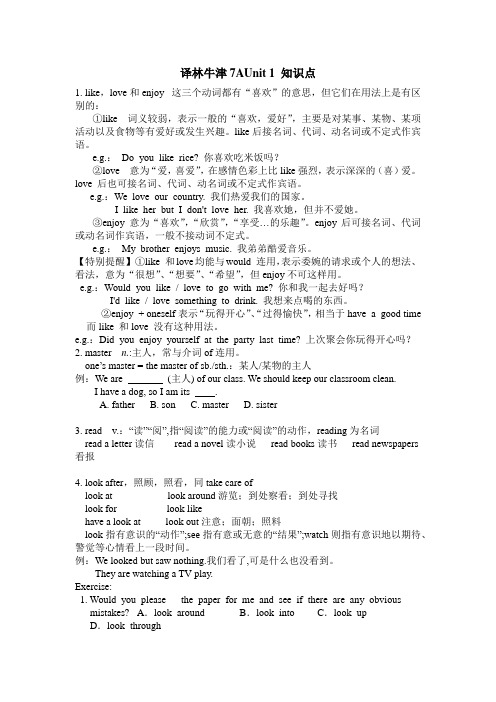
译林牛津7AUnit 1 知识点1. like,love和enjoy 这三个动词都有“喜欢”的意思,但它们在用法上是有区别的:①like 词义较弱,表示一般的“喜欢,爱好”,主要是对某事、某物、某项活动以及食物等有爱好或发生兴趣。
like后接名词、代词、动名词或不定式作宾语。
e.g.:Do you like rice? 你喜欢吃米饭吗?②love 意为“爱,喜爱”,在感情色彩上比like强烈,表示深深的(喜)爱。
love 后也可接名词、代词、动名词或不定式作宾语。
e.g.:We love our country. 我们热爱我们的国家。
I like her but I don't love her. 我喜欢她,但并不爱她。
③enjoy 意为“喜欢”,“欣赏”,“享受…的乐趣”。
enjoy后可接名词、代词或动名词作宾语,一般不接动词不定式。
e.g.:My brother enjoys music. 我弟弟酷爱音乐。
【特别提醒】①like 和love均能与would 连用,表示委婉的请求或个人的想法、看法,意为“很想”、“想要”、“希望”,但enjoy不可这样用。
e.g.:Would you like / love to go with me? 你和我一起去好吗?I'd like / love something to drink. 我想来点喝的东西。
②enjoy + oneself表示“玩得开心”、“过得愉快”,相当于have a good time而like 和love 没有这种用法。
e.g.:Did you enjoy yourself at the party last time? 上次聚会你玩得开心吗?2. master n.:主人,常与介词of连用。
one’s master = the master of sb./sth.:某人/某物的主人例:We are (主人) of our class. We should keep our classroom clean.I have a dog, so I am its .A. fatherB. sonC. masterD. sister3. read v.:“读”“阅”,指“阅读”的能力或“阅读”的动作,reading为名词read a letter读信read a novel读小说read books读书read newspapers看报4. look after,照顾,照看,同take care oflook at look around游览;到处察看;到处寻找look for look likehave a look at look out注意;面朝;照料look指有意识的“动作”;see指有意或无意的“结果”;watch则指有意识地以期待、警觉等心情看上一段时间。
